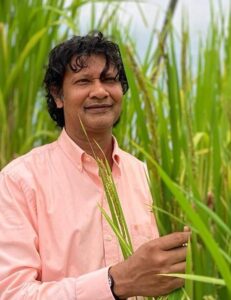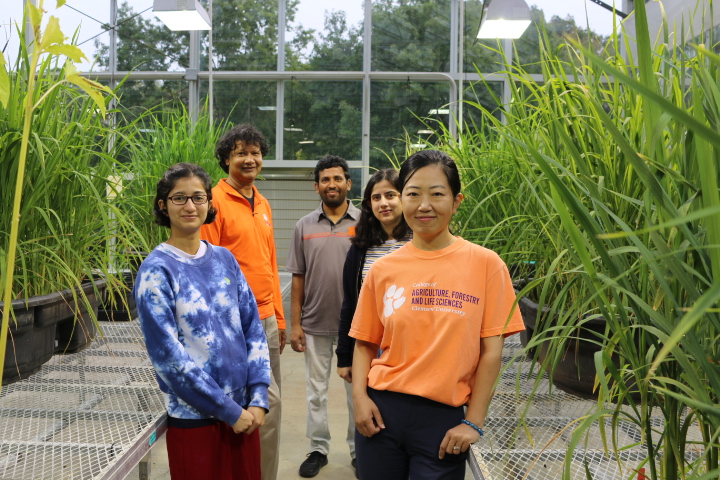Raghupathy “Karthi” Karthikeyan is an agricultural engineer from Tamil Nadu, India, who has transformed the field he was assigned in college into a career he loves.
Karthikeyan is the Charles Carter Newman Endowed Chair Professor of Natural Resources Engineering in Clemson’s Agricultural Sciences Department. He began his journey in agricultural engineering after taking a college entrance exam. Newman was Clemson’s first graduate. After graduation, he served as a horticulture professor from 1899 to 1952.

“I honestly did not choose to follow an agricultural engineering path,” Karthikeyan said. “In India, based on the engineering college entrance exams, a person is ‘assigned’ a discipline. Agricultural engineering was assigned to me. I learned to love what I had.”
He earned a bachelor’s degree in agricultural engineering from Tamil Nadu Agricultural University in India, a master’s degree in agricultural engineering from the University of Georgia, and a doctorate in biological and agricultural engineering from Kansas State University.
Karthikeyan joined Clemson University in 2019. With more than 25 years of experience applying engineering principles to sustainable crop production systems, his research expertise includes crop modeling, plant physiology, water quality and soil microbiology. He has published 80 research papers and developed three water quality models.
His research has a global impact, translating findings into applications at local, national and international levels.
“Every project I work on has practical applications,” Karthikeyan said. “It’s rewarding to see results on the ground, impacting real-world systems.”
His research goals include developing climate-resilient crops, sustainable agroecosystems and clean water resources.

Research with impact
Karthikeyan leads an interdisciplinary team focused on improving salt tolerance in crops and developing desalination technologies. He is involved in a USDA National Institute of Food and Agriculture-funded study using saline-water irrigation to grow salt-tolerant crops.
He collaborates with researchers from Clemson University, the University of Florida and the USDA Agricultural Research Service to create a controlled environment agriculture (CEA) platform for growing salt-tolerant crops like mustard greens, cucumbers and tomatoes using saline water.
“In many freshwater-scarce regions, saline water sources such as brackish groundwater are available for irrigation,” Karthikeyan said. “However, increased soil salinization restricts these water sources’ use in traditional open-field cultivation, a problem that can be reduced with soilless hydroponic cultivation in CEA.”
In another study, Karthikeyan collaborates with other land-grant institutions and the USDA to explore how climate-smart crop production technologies can enhance rice production.
“We will work to identify climate-resilient, salt-tolerant rice cultivars and suitable management practices for rice growers,” Karthikeyan said.
Rice was once a dominant crop in South Carolina until saltwater intrusion, among other problems, forced farmers to shift to other crops. In addition to researching climate-resilient rice, Karthikeyan is developing a special topics class and coordinating a mini-symposium on sustainable rice production.
“Growers will learn how to make the correct decisions at the right times to help reduce yield losses, labor and energy costs,” he said.

A teacher’s touch
Karthikeyan also has a passion for teaching, a love he discovered in elementary school when he served as a peer teacher.
“I start by helping students learn how to develop a hypothesis and communicate their research results,” he said. “I want students to apply basic science to solve real-world challenges in agriculture.”
Karthikeyan teaches AGSC 6100 Newman Seminar in Agricultural Sciences in the fall and co-teaches AGSC 8890 Research Methods in Agricultural Sciences in the spring.
He emphasizes hands-on experience in research for his students.
“Agriculture is an interdisciplinary science,” Karthikeyan said. “Students should acquire foundational knowledge, develop hands-on experience and keep updating their skills with cutting-edge technologies to tackle today’s agricultural challenges.”
Michael Vassalos, an associate professor of agribusiness, co-teaches AGSC 8890 with Karthikeyan and said it “is a great privilege” to share this responsibility.
“His ability to communicate with students advanced topics in a way that can be easily understood is extraordinary,” Vassalos said. “It is clear from the first day that he cares about the students, has high standards and wants every one to succeed.”
He has also worked with Karthikeyan on research projects.
“Dr. Karthikeyan’s leadership abilities are unparalleled,” Vassalos said. “He can bring together very diverse groups, under a common research goal. The success these groups have on securing funding is a testament to his leadership and research abilities.”
Former student Qiong Su, now an assistant professor, said his mentorship taught her to emphasize real-world problem-solving in agriculture.
“Studying under Dr. Karthi was an inspiring experience,” Qiong said. “His dedication to sustainable agriculture and climate-resilient crop production created an environment that encouraged innovation and learning. He gave students the freedom to pursue their research interests independently, fostering both creativity and initiative.”
Qiong uses knowledge gained from studying under Karthikeyan’s guidance to teach students in the Clemson Department of Agricultural Sciences.
“I now apply this principle in my teaching and research by focusing on projects with practical and impactful outcomes, such as developing climate-resilient crop and water management strategies,” she said. “His example motivates me to involve my students actively in hands-on problem-solving and to emphasize research that not only advances academic knowledge but also serves societal and environmental goals.”
When not immersed in academia, Karthikeyan enjoys listening to eclectic mix of music, gardening and spending time with his wife Lakshmi and daughter Samprokshana and their pets – two rescued feral kittens, Sherlock and Cappuccino.
“I enjoy playing with them in our backyard,” he said. “Cappuccino will bring sweet gum balls to me like a retriever puppy. And, during rainy days, while I help guide box turtles to safety, Sherlock likes to pet them.”
-END-
